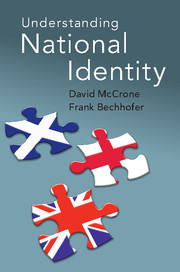Book contents
- Frontmatter
- Contents
- List of tables
- Preface
- Introduction
- 1 Thinking about national identity
- 2 Accessing national identity
- 3 National identity: do people care about it?
- 4 Debatable lands: national identities on the border
- 5 Claiming national identity
- 6 The politics of national identity
- 7 The notional other: ethnicity and national identity
- 8 A manner of speaking: the end of being British?
- 9 Whither national identity?
- Appendix National identity publications
- Bibliography
- Index
3 - National identity: do people care about it?
Published online by Cambridge University Press: 05 April 2015
- Frontmatter
- Contents
- List of tables
- Preface
- Introduction
- 1 Thinking about national identity
- 2 Accessing national identity
- 3 National identity: do people care about it?
- 4 Debatable lands: national identities on the border
- 5 Claiming national identity
- 6 The politics of national identity
- 7 The notional other: ethnicity and national identity
- 8 A manner of speaking: the end of being British?
- 9 Whither national identity?
- Appendix National identity publications
- Bibliography
- Index
Summary
Taken as a whole, the overall purpose of this chapter is to ask, when it comes down to it, whether people find national identity meaningful, whether it really matters to them. We will discuss and bring empirical data to bear upon a number of common assumptions:
• That many people do not care, and possibly do not know, about national identity. There is a particularly ‘British’ (or maybe, as we shall see shortly, ‘English’) form of this argument, namely, that while it matters to the French, the Germans, the Americans and so on, the people of these islands have a much more relaxed and latitudinarian view of these things.
• That, if it matters at all, ‘national’ identity is less important to people than other forms of social identity such as their social class, gender or family status.
• That, if anything, people in England and Scotland ‘think small’, that is, identifying far more with locality, town or region, than with ‘nation’ or state.
• That national identity categories, as used by sociologists and political scientists, are fairly meaningless, accepted by people if they are asked questions by such social scientists, but not part of their own personal world. We explore that assertion by looking at the accounts of national identity which people give in non-survey settings, as well as by examining the reasons they give for their national identity choices.
• Finally, we show how national identity comes into play in different contexts, be they cultural or political.
Let us start with the fairly widespread claim that the Scots, the Irish and the Welsh manifestly care about national identity, but somehow the English do not. As Krishan Kumar observed: ‘unlike the French, the English have little tradition of reflection on nationalism and national identity’ (2006: 423).
- Type
- Chapter
- Information
- Understanding National Identity , pp. 43 - 67Publisher: Cambridge University PressPrint publication year: 2015

